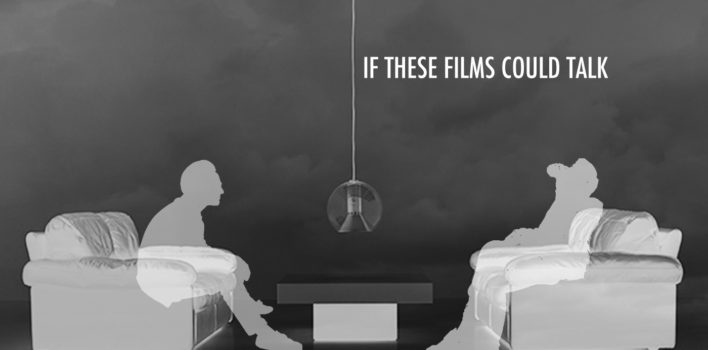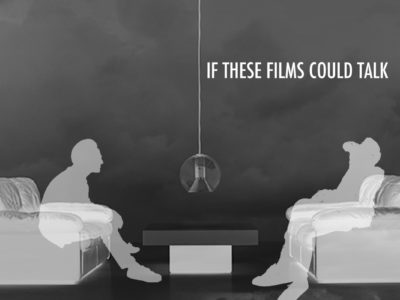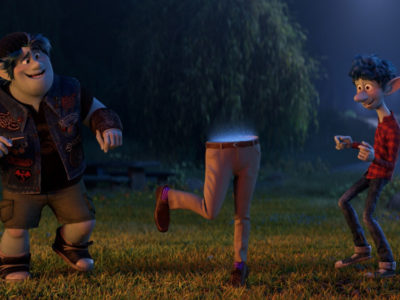Reflections on a Sense of the Self: Toy Story (1995) and Us (2019)
In the social jungle of human existence, there is no feeling of being alive without a sense of identity.”
– Erik Erikson, Identity, Youth, and Crisis
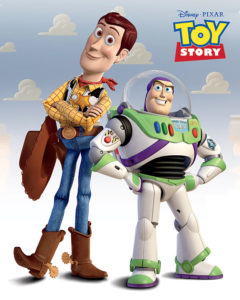 One of the first films that comes to mind when thinking of explorations of the self is Disney’s 1995 film Toy Story. In the film, we see both Woody and Buzz Lightyear’s struggle to understand both their sense of self and their place in the world. For Woody, his sense of self was rooted in being Andy’s favorite toy, the center of attention. He was the de facto leader, the one all the other toys seemingly looked up to for their sense of self. However, when Buzz entered the scene, this dynamic was radically disrupted. Woody’s sense of self was threatened. His perception was that the otherwas there to ruin his way of beingin the world. We see this anxiety on display in the montage which shows Andy’s room – once full of reminders of Woody and his cowboy life – covered with Buzz Lightyear memorabilia and dreams of space exploration. This sense of anxiety led Woody to take drastic measure to correct this disorientation, even if that meant knocking Buzz out of a second story window into the bushes below. For Woody, his sense of self and his orientation towards purpose, meaning, and manageability were contingent upon being wanted, valued, and centered in the hearts of both Andy and, in a secondary sense, the other toys. Rather than a sense of self that was ontologically grounded in something intrinsic to one’s personhood, Woody’s sense of self was, in some sense, granted to him on the whims of Andy’s feelings. Without this, Woody struggled to understand who he was and what his place in the world was. This, however, was not only Woody’s struggle. Buzz also faced similar anxieties.
One of the first films that comes to mind when thinking of explorations of the self is Disney’s 1995 film Toy Story. In the film, we see both Woody and Buzz Lightyear’s struggle to understand both their sense of self and their place in the world. For Woody, his sense of self was rooted in being Andy’s favorite toy, the center of attention. He was the de facto leader, the one all the other toys seemingly looked up to for their sense of self. However, when Buzz entered the scene, this dynamic was radically disrupted. Woody’s sense of self was threatened. His perception was that the otherwas there to ruin his way of beingin the world. We see this anxiety on display in the montage which shows Andy’s room – once full of reminders of Woody and his cowboy life – covered with Buzz Lightyear memorabilia and dreams of space exploration. This sense of anxiety led Woody to take drastic measure to correct this disorientation, even if that meant knocking Buzz out of a second story window into the bushes below. For Woody, his sense of self and his orientation towards purpose, meaning, and manageability were contingent upon being wanted, valued, and centered in the hearts of both Andy and, in a secondary sense, the other toys. Rather than a sense of self that was ontologically grounded in something intrinsic to one’s personhood, Woody’s sense of self was, in some sense, granted to him on the whims of Andy’s feelings. Without this, Woody struggled to understand who he was and what his place in the world was. This, however, was not only Woody’s struggle. Buzz also faced similar anxieties.
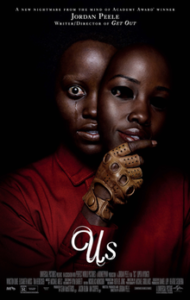 For Buzz Lightyear, his sense of self was not rooted in reality. In his mind, he wasn’t a toy with which children played. He was, in fact, an intergalactic spaceman who was on a literal mission to find the bad guys and save the day. His sense of self was rooted not in Andy’s acceptance of him, or even in the other toy’s acceptance of him, but in his perceived sense of duty. When this sense of duty was revealed to be mistaken, Buzz himself faced anxiety over his sense of self. We see this displayed when Buzz tries to fly down the stairs in Sid’s house, only to come crashing down hard, losing an arm in the process. His sense of self was further disrupted by Sid’s sister discovering him on the bottom of the stairs and was briefly – until Woody finds him – transformed into Mrs. Nesbit during a tea party. For both Buzz and Woody, the remaining development of their character arcs were focused on not merely finding their way back home to Andy, but, also, discovering their true selves, particularly in relation to each other, to Andy’s relationship to them, and to their relationship with the other toys. And as they discover, when they land in the box next to Andy in the backseat of the car, Andy’s excitement is that they’re home, that he has “found” them. Andy isn’t excited to see one more than the other. He is excited to see both. Thus, both Woody and Buzz see the perceptions of their sense of self – once rooted in fear or a misunderstanding of reality – transformed by Andy’s disposition towards them. In other words, the issues surrounding their sense of self came from within.
For Buzz Lightyear, his sense of self was not rooted in reality. In his mind, he wasn’t a toy with which children played. He was, in fact, an intergalactic spaceman who was on a literal mission to find the bad guys and save the day. His sense of self was rooted not in Andy’s acceptance of him, or even in the other toy’s acceptance of him, but in his perceived sense of duty. When this sense of duty was revealed to be mistaken, Buzz himself faced anxiety over his sense of self. We see this displayed when Buzz tries to fly down the stairs in Sid’s house, only to come crashing down hard, losing an arm in the process. His sense of self was further disrupted by Sid’s sister discovering him on the bottom of the stairs and was briefly – until Woody finds him – transformed into Mrs. Nesbit during a tea party. For both Buzz and Woody, the remaining development of their character arcs were focused on not merely finding their way back home to Andy, but, also, discovering their true selves, particularly in relation to each other, to Andy’s relationship to them, and to their relationship with the other toys. And as they discover, when they land in the box next to Andy in the backseat of the car, Andy’s excitement is that they’re home, that he has “found” them. Andy isn’t excited to see one more than the other. He is excited to see both. Thus, both Woody and Buzz see the perceptions of their sense of self – once rooted in fear or a misunderstanding of reality – transformed by Andy’s disposition towards them. In other words, the issues surrounding their sense of self came from within.
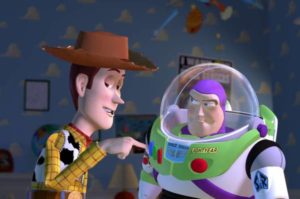 What happens, though, if the anxiety over the self doesn’t come from within, but from without? Jordan Peele’s sophomore effort, Us, explores just that concept. In the film, Adelaide Wilson’s childhood trauma left her with a complicated sense of self, one rooted in control, disconnection, and silence. Her experience in the house of mirrors unsettled her identity and, even as a child, her place in the world. Adelaide’s sense of self was always on guard against anyone who might trigger or expose the past, who might disrupt the self she has constructed as, in many ways, a coping mechanism. With the introduction of the Tethered, Adelaide’s sense of self was challenged by the other, by a relational dynamic of strangers which also called into question her family’s place in the world. Her anxiety of self was exposed since she couldn’t have control over this new situation and there wasn’t a quick fix to make it go back to her previous sense of purpose, meaning, and manageability. But our perception of Adelaide’s sense of self called into question the audience’s own perceptions of Adelaide’s identity and highlighted how people surprise us when we learn they are not who we thought they were. As the audience, we bought into her sense of self without considering whether what we were seeing was grounded in reality or if our perceptions were inaccurate from the outset. When it is revealed that Adelaide is actually one of the Tethered clones and the Tethered leader Red is actually the real Adelaide, the audience has to question their perceptions of the previous scenes. Furthermore, this narrative turn invites the audience to consider not just the social subtexts Peele was unveiling, but also the ways this explores implications for our understanding of the self. With the Adelaide/Red dynamic, the audience is invited to consider the impact when one’s sense of self is, in some sense, stolen (perhaps not as literally as in Us) or used to benefit another’s sense of belonging or place in the world.
What happens, though, if the anxiety over the self doesn’t come from within, but from without? Jordan Peele’s sophomore effort, Us, explores just that concept. In the film, Adelaide Wilson’s childhood trauma left her with a complicated sense of self, one rooted in control, disconnection, and silence. Her experience in the house of mirrors unsettled her identity and, even as a child, her place in the world. Adelaide’s sense of self was always on guard against anyone who might trigger or expose the past, who might disrupt the self she has constructed as, in many ways, a coping mechanism. With the introduction of the Tethered, Adelaide’s sense of self was challenged by the other, by a relational dynamic of strangers which also called into question her family’s place in the world. Her anxiety of self was exposed since she couldn’t have control over this new situation and there wasn’t a quick fix to make it go back to her previous sense of purpose, meaning, and manageability. But our perception of Adelaide’s sense of self called into question the audience’s own perceptions of Adelaide’s identity and highlighted how people surprise us when we learn they are not who we thought they were. As the audience, we bought into her sense of self without considering whether what we were seeing was grounded in reality or if our perceptions were inaccurate from the outset. When it is revealed that Adelaide is actually one of the Tethered clones and the Tethered leader Red is actually the real Adelaide, the audience has to question their perceptions of the previous scenes. Furthermore, this narrative turn invites the audience to consider not just the social subtexts Peele was unveiling, but also the ways this explores implications for our understanding of the self. With the Adelaide/Red dynamic, the audience is invited to consider the impact when one’s sense of self is, in some sense, stolen (perhaps not as literally as in Us) or used to benefit another’s sense of belonging or place in the world.
 Both of these explorations of the self, if left here, might allow some to think the formation of the self is an individual affair, a matter of mere self-construction. But this is a reductionistic view of self. Our sense of identity, at minimum, features such factors as our biological and psychological makeup, our history and personal memory, our relationships, our culture, our faith commitments or lack thereof, and the dynamics of growth and maturity in our lives. As such, identity formation is a dynamic of both the individual self and the life in community with others. With Toy Story, while Woody perhaps over-relies on others in order to define his self, this is not to say his community of fellow toys plays zero role in his identity formation. Within Andy’s bedroom, the toys have created a certain culture, a certain way of being in the world which allows for all of them to have a sense of purpose, meaning, and manageability. In other words, Woody and the other toys create a space where they all are allowed to flourish. Part of the journey in Woody and Buzz’s relationship is not only concerning their own personal journeys, but also in understanding how this dynamic will contribute to the other’s flourishing without taking away something special from each of them.
Both of these explorations of the self, if left here, might allow some to think the formation of the self is an individual affair, a matter of mere self-construction. But this is a reductionistic view of self. Our sense of identity, at minimum, features such factors as our biological and psychological makeup, our history and personal memory, our relationships, our culture, our faith commitments or lack thereof, and the dynamics of growth and maturity in our lives. As such, identity formation is a dynamic of both the individual self and the life in community with others. With Toy Story, while Woody perhaps over-relies on others in order to define his self, this is not to say his community of fellow toys plays zero role in his identity formation. Within Andy’s bedroom, the toys have created a certain culture, a certain way of being in the world which allows for all of them to have a sense of purpose, meaning, and manageability. In other words, Woody and the other toys create a space where they all are allowed to flourish. Part of the journey in Woody and Buzz’s relationship is not only concerning their own personal journeys, but also in understanding how this dynamic will contribute to the other’s flourishing without taking away something special from each of them.
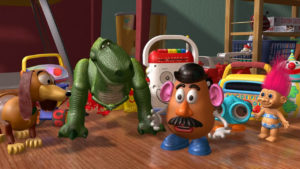 On the other hand, what we see in Us is the consequences of constructing an identity in a way which denigrates community flourishing, especially when it affects a group(s) one considers the other. Not only does this deeply effect one’s own sense of self, but it contributes to an entire group’s orientation to their place in the world. To say it another way, how we choose to construct our identity apart from considerations of community impact can often have consequences which we don’t adequately account for. This, in part, explains the anxiety of Woody and Buzz in Toy Story. While enmeshment and co-dependency are unhealthy expressions of identity formation in the context of our relationship to others, we are made for relating to others, not merely to define who we are in isolation from these other connections which make life meaningful. As both Pixar and Peele impart to us in these films, identity formation is often a complicated, messy process and figuring out our place in the world is often not a straight line from problem to solution. And yet, this adventure in our humanity is ultimately about meaning-making, about navigating the complexities of human flourishing and whether our lives have a broader context to them than what we feel like is true in those moments.
On the other hand, what we see in Us is the consequences of constructing an identity in a way which denigrates community flourishing, especially when it affects a group(s) one considers the other. Not only does this deeply effect one’s own sense of self, but it contributes to an entire group’s orientation to their place in the world. To say it another way, how we choose to construct our identity apart from considerations of community impact can often have consequences which we don’t adequately account for. This, in part, explains the anxiety of Woody and Buzz in Toy Story. While enmeshment and co-dependency are unhealthy expressions of identity formation in the context of our relationship to others, we are made for relating to others, not merely to define who we are in isolation from these other connections which make life meaningful. As both Pixar and Peele impart to us in these films, identity formation is often a complicated, messy process and figuring out our place in the world is often not a straight line from problem to solution. And yet, this adventure in our humanity is ultimately about meaning-making, about navigating the complexities of human flourishing and whether our lives have a broader context to them than what we feel like is true in those moments.
Like Woody and Buzz, rather than believing life is a zero-sum game, we can recognize the unique contributions we bring to a group and how we can work together to promote their flourishing. With Us, we are reminded that sometimes all we can do is try our best to flourish, even if we find ourselves in contexts which are less than ideal. After all, one of the hardest things in the world is learning how to be human in a world which gives us every reason to be distracted from being healthy, whole, and self-aware.


